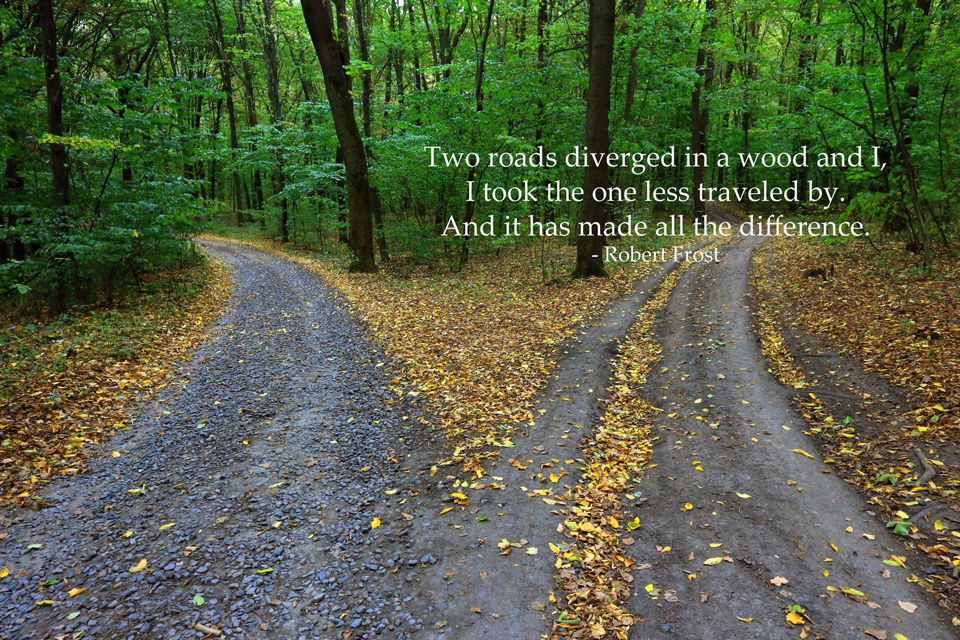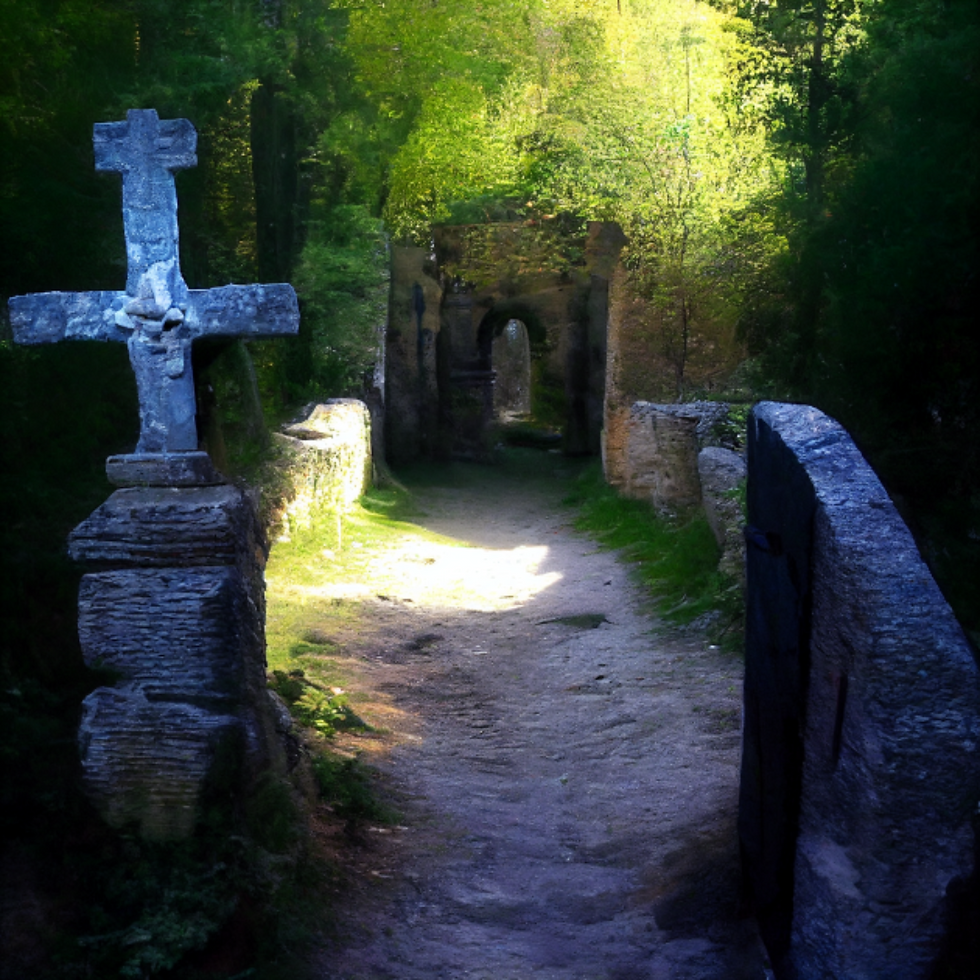The Choice of Two Paths
- Douglas Kuhl
- Feb 22, 2023
- 5 min read
“Enter by the narrow gate. For the gate is wide and the way is easy that leads to destruction, and those who enter by it are many. For the gate is narrow and the way is hard that leads to life, and those who find it are few. (Jesus Words Found Mathew 7:13-14)

The "narrow gate" leads to becoming a son or daughter of God through a personal relationship with God the Father and His Son, Jesus Christ. To become a son or daughter of God, you must receive Jesus Christ into your heart and life. This means inviting him to be the Lord of your life and committing to follow him. By doing this you invite the Holy Spirit into your life, and you have eternal life, as it is the path of grace that God has set for his followers. The "narrow gate" requires obedience to God's will, which requires discipline, self-control, and adherence to God's will. It may be more challenging to follow, as it often goes against the desires and values of the world.

In contrast, the "wide gate" represents the path of sin and disobedience, which may be more appealing and easier to follow in the short term, but ultimately leads to destruction and separation from God. Jesus' teaching emphasizes the importance of choosing the right path and being willing to make sacrifices and endure challenges in order to follow God's will and receive the ultimate reward of eternal life.
The path of grace refers to the idea that salvation and forgiveness of sins are given freely by God as an unearned gift, based on his mercy and love rather than our own efforts or good deeds.

The path of grace begins with an acknowledgement of our own sinfulness and need for God's forgiveness. Jesus, through his death and resurrection, made a way for us to be reconciled with God and receive his grace. To receive this grace, we must have faith in Jesus Christ as our Lord and Savior, and confess our sins to God, asking for his forgiveness. Through this process of repentance and faith, we can receive the gift of salvation and be reconciled to God. Once we have received God's grace, we are called to live a life of

obedience and service to God, empowered by the Holy Spirit. We are not compelled to obey a strict list of manmade rules and laws but rather we follow the statues that are drawn deep within our hearts. This involves following the teachings of Christ, loving others, and sharing the message of grace with others.
The path ahead may indeed be rugged and uncertain, but it is important to trust in the journey and believe that there is a good way waiting to be discovered. Seeking out the wisdom of those who have come before us can be incredibly helpful in navigating the challenges that lie ahead, and learning from the experiences of others can help us make better decisions and avoid common pitfalls.
In the book of Acts, we see that the apostle Paul was on his way to Jerusalem, even though many of the people around him, including other believers, warned him against it. They feared that he would be arrested and possibly killed. However, Paul felt that he was being led by the Holy Spirit to go to Jerusalem, even though he knew that it would be a difficult and potentially dangerous journey. He says in Acts 20:22-23, "And now, compelled by the Spirit, I am going to Jerusalem, not knowing what will happen to me there. I only know that in every city the Holy Spirit warns me that prison and hardships are facing me."

Despite the warnings and concerns of others, Paul trusted in the leading of the Holy Spirit and followed the path that he felt called to. This decision ultimately led to his arrest and imprisonment, but it also gave him the opportunity to testify before rulers and share the message of the gospel with a wider audience.
Paul's example shows us the importance of discerning the leading of the Holy Spirit in our lives, even when it may go against the advice or expectations of others. While it is important to seek out the wisdom of those around us, ultimately, we must trust in the guidance of the Holy Spirit and follow the path that we feel called to, even if it may be difficult or uncertain.
John Eldredge is a Christian author who often writes about the importance of finding rest and restoration in the midst of the challenges and uncertainties of life. In his book "Get Your Life Back," Eldredge emphasizes the need for intentional rest and self-care in order to nurture our souls and stay grounded in the midst of a busy and demanding world. Eldredge suggests

that taking time to disconnect from technology and the constant stimulation of modern life can be a powerful way to cultivate a sense of inner peace and stillness. He encourages readers to take regular breaks from their phones and computers, and to spend time in nature, engaging in activities like hiking, camping, or simply sitting outside and enjoying the beauty of the natural world.
In addition to spending time in nature, Eldredge also emphasizes the importance of prayer and meditation as a means of finding rest and restoration. He suggests that taking time each day to connect with God and cultivate a sense of inner peace can help us stay grounded and centered, even in the midst of difficult circumstances.

Overall, Eldredge's writing underscores the importance of intentionally creating space in our lives for rest and self-care, even when the demands of life may seem overwhelming. By cultivating a sense of inner peace and stillness through practices like prayer, meditation, and spending time in nature, we can find a deep and abiding rest for our souls and be better equipped to navigate the challenges and uncertainties of life with grace and resilience.

In the midst of the wild and unpredictable nature of life, it is also important to remember to take time for rest and self-care. We can find a deep and abiding rest for our souls by cultivating a sense of inner peace and stillness, whether through prayer, meditation, or simply taking time to connect with nature and appreciate the beauty of the world around us.
By embracing the challenges and uncertainties of life with courage, wisdom, and a sense of inner peace, we can navigate the road less traveled or enter through the narrow gate with confidence and trust that we will ultimately find our way to a more meaningful and fulfilling life.
The Road Not Taken

Two roads diverged in a yellow wood,
And sorry I could not travel both
And be one traveler, long I stood
And looked down one as far as I could
To where it bent in the undergrowth;
Then took the other, as just as fair,
And having perhaps the better claim,
Because it was grassy and wanted wear;
Though as for that the passing there
Had worn them really about the same,

And both that morning equally lay
In leaves no step had trodden black.
Oh, I kept the first for another day!
Yet knowing how way leads on to way,
I doubted if I should ever come back.
I shall be telling this with a sigh Somewhere ages and ages hence: Two roads diverged in a wood, and I— I took the one less traveled by,
And that has made all the difference.
By Robert Frost




Comments